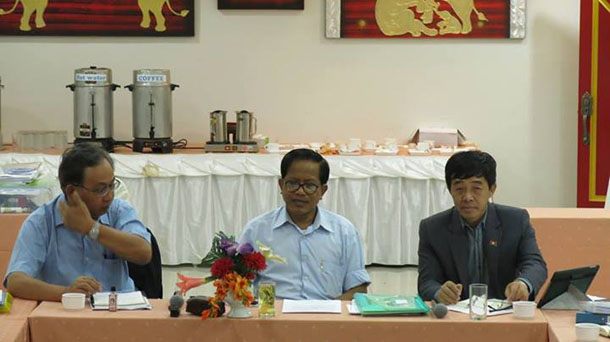CHAING MAI, Thailand — The Thai army has asked Burma’s ethnic armed groups to inform authorities of any ceasefire meetings held in Thailand so that the Thai army can observe the discussions, according to ethnic representatives.
Khu Oo Reh, general secretary of the United Nationalities Federal Council (UNFC), said ethnic organizations had been informed in recent days that they are to notify respective local Thai army commanders about their planned meetings, workshops and training events.
“They said they want to follow and be aware of news on Burma’s peace process, which we are working on. They want to study it closely. So, we are supposed to inform them officially. But, they will make their own decision whether to attend and observe our activities,” he told The Irrawaddy.
Khu Oo Reh said the UNFC, an alliance of 12 ethnic groups, did not object to the request.
Thai intelligence officers have long observed the ethnic groups’ meetings on Thai soil, although they are not allowed to attend the events.
Nai Hong Sar, the head of the Nationwide Ceasefire Coordination Team (NCCT), which conducts ceasefire negotiations with the Burmese government and represents 16 ethnic groups, said the Thai military government that came to power in a May 22 coup has shown a greater interest in Burma’s peace process.
Nai Hong Sar said the NCCT and the government’s Union Peacemaking Work Committee, led by Minister Aung Min, plan to hold a meeting in Chiang Mai in the coming weeks to discuss the stalled negotiations over a nationwide ceasefire.
The Shan Herald Agency for News (SHAN) reported that Lt-Gen Sathit Pittrat, the commander of the Thai Third Regional Army, which oversees security along the Thai-Burmese border, had recently given the order for Thai officers to observe the ceasefire meetings.
SHAN quoted an unnamed Thai army officer as saying that ethnic groups would now “be required to give a written notice [of meetings] and allow one or two of our officials as observers. We will be happy to accommodate the peace process. Burma’s peace is in our interests.”
The officer added that the ethnic armed groups should be aware of the fact that Thailand and Burma agreed to “cooperate closely against drug trafficking and arms smuggling” along the border.
Ethnic armed groups, many of which have bases near the Thai-Burma border, have long held gatherings in Thailand, often meeting in Chiang Mai and Chiang Rai in northern Thailand, or in Mae Sot, located across the border from Burma’s Karen State.
Since nationwide ceasefire negotiations began in mid-2013, the ethnic groups have regularly met in Chiang Mai with Burmese government officials.
Numerous ethnic NGOs and Burmese human rights groups have also long based themselves in the Thai border regions during the decades of repression under the former Burmese junta.
Contacted staff of several ethnic NGOs in Thailand said they had so far not been approached by the Thai army with requests regarding their meetings and events.
The Thai military regime has been quick to reach out to the Burmese government and has said it wants to boost security and economic cooperation with Burma. It has also indicated that it is keen to see the repatriation of the roughly 100,000 Burmese refugees living on the Thai-Burma border in coming years, a plan that is contingent on the success of the peace process.
















